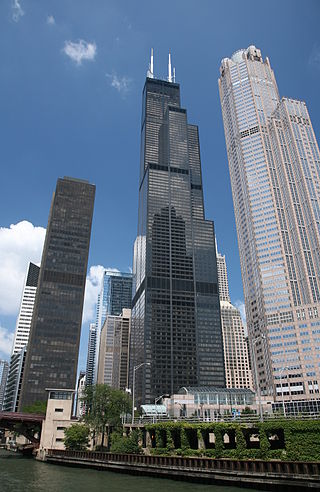
The buildings and architecture of Chicago reflect the city's history and multicultural heritage, featuring prominent buildings in a variety of styles. Most structures downtown were destroyed by the Great Chicago Fire in 1871.

The City Hall-County Building, commonly known as City Hall, is a 12-story building in Chicago, Illinois that houses the seats of government of the City of Chicago and Cook County. The building's west side holds the offices of the mayor, city clerk, and city treasurer; some city departments; offices of alderpersons of Chicago's 50 wards; and the Chicago City Council's chambers. The building's east side houses offices of the Government of Cook County, including the Cook County Board of Commissioners' chambers.
John Wellborn Root Jr. was a significant United States architect based in Chicago. He was the son of architect John Wellborn Root. As a young man, he graduated from Cornell University and studied architecture at Paris' École nationale supérieure des Beaux-Arts, where he became friends with John Augur Holabird, the son of another famous Chicago architect. Root returned to the States and joined his friend on the architectural staff at Holabird & Roche in 1919.
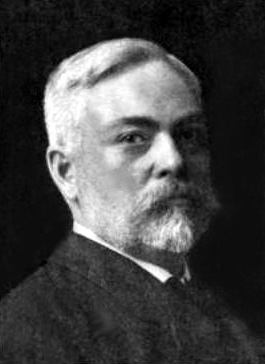
William Holabird was an American architect.
Martin Roche (1853–1927) was an American architect.
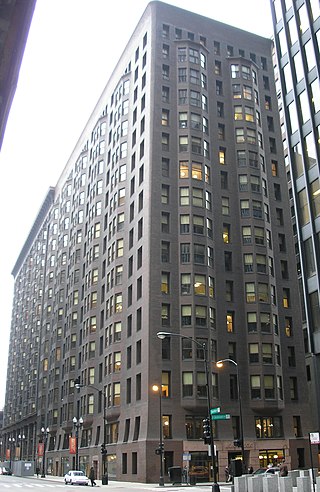
The Monadnock Building is a 16-story skyscraper located at 53 West Jackson Boulevard in the south Loop area of Chicago. The north half of the building was designed by the firm of Burnham & Root and built starting in 1891. At 215 feet, it is the tallest load-bearing brick building ever constructed. It employed the first portal system of wind bracing in the United States. Its decorative staircases represent the first structural use of aluminum in building construction. The later south half, constructed in 1893, was designed by Holabird & Roche and is similar in color and profile to the original, but the design is more traditionally ornate. When completed, it was the largest office building in the world. The success of the building was the catalyst for an important new business center at the southern end of the Loop.

John Augur Holabird (1886–1945) was an American architect based in Chicago.
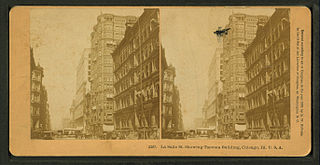
The architectural firm now known as Holabird & Root was founded in Chicago in 1880. Over the years, the firm has changed its name several times and adapted to the architectural style then current — from Chicago School to Art Deco to Modern Architecture to Sustainable Architecture.

The Chicago Board of Trade Building is a 44-story, 604-foot (184 m) Art Deco skyscraper located in the Chicago Loop, standing at the foot of the LaSalle Street canyon. Built in 1930 for the Chicago Board of Trade (CBOT), it has served as the primary trading venue of the CBOT and later the CME Group, formed in 2007 by the merger of the CBOT and the Chicago Mercantile Exchange. In 2012, the CME Group sold the CBOT Building to a consortium of real estate investors, including GlenStar Properties LLC and USAA Real Estate Company.

The One North LaSalle Building or One LaSalle Street Building is a building in the LaSalle Street corridor in the Loop community area of Chicago managed by MB Real Estate. It was for some time one of Chicago's tallest buildings. Built in 1930 by architects Vitzthum & Burns, it replaces the Tacoma Building by Holabird & Roche. The building is located across Madison Street from Roanoke Building. It was designated a Chicago Landmark on April 16, 1996, and added to the National Register of Historic Places on November 22, 1999. Its 5th floor relief panels depict the explorations of René-Robert Cavelier, Sieur de La Salle.

The Jewelers Row District is a historic district in the Loop community area of Chicago, Illinois in the United States. Running along Wabash Avenue, primarily between East Washington Street and East Monroe Street, the buildings in the district were built between 1872 and 1941 and were designed by many architects, including Graham, Anderson, Probst & White, John Mills Van Osdel, Adler & Sullivan, Alfred Alschuler, D. H. Burnham & Co., and Holabird & Roche in a variety of styles, including Italianate, Chicago School, and Art Deco. The buildings are variously loft buildings used for small manufacturers, mercantile buildings, office buildings and early skyscrapers.

The LaSalle–Wacker Building, at 221 North LaSalle Street, is a 41-story skyscraper at the north end of the LaSalle Street canyon in the Loop community area of Chicago, Illinois, United States.
Robert Bruegmann is an historian of architecture, landscape and the built environment. He is a professor at the University of Illinois at Chicago, and a specialist on the Chicago school of architecture. Bruegmann is best known for his research on the architectural firm of Holabird & Root, and is also a commentator on urban sprawl.

George A. Fuller was an American architect often credited as being the "inventor" of modern skyscrapers and the modern contracting system.
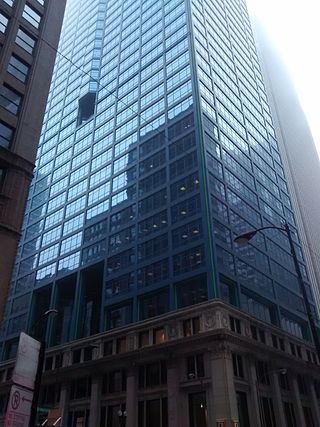
10 South LaSalle is a 502 ft tall skyscraper in the LaSalle Street financial district of Chicago, Illinois. It was completed in 1989 and has 37 floors, and is tied with One Superior Place for the 87th tallest building in the city.

The University Club of Chicago is a private social club located at 76 East Monroe Street at the corner of Michigan Avenue & Monroe Street in downtown Chicago, Illinois. It received its charter in 1887, when a group of college friends, principally alumni of Harvard, Yale, and Princeton, founded the club hoping to further their collegial ties and enjoy intellectual pursuits.

The La Salle Hotel was a historic hotel located on the northwest corner of La Salle Street and Madison Street in the Chicago Loop community area of Chicago, Illinois, United States. It was designed by Holabird & Roche and opened in 1909. After a major fire in 1946, the hotel was refurbished and reopened in 1947. It closed in 1976 and was demolished for construction of an office building.

The Three Arts Club of Chicago was a Chicago home and club for women in the "three arts" of music, painting and drama. The building is on the List of Chicago Landmarks as of June 10, 1981. The club, modeled on the Three Arts Club of New York, was founded in 1912.
The University School for Girls was a private high school in Chicago during the early to mid-20th century. Although less prestigious than the Latin School for Girls, it was "one of the city's most elegant educational institutions," and drew similarly from the daughters of the city's elite.
Edward Carson Waller was a Chicago developer and patron of Frank Lloyd Wright who pioneered development of subsidized low-income housing and some of the first skyscrapers in Chicago.
















